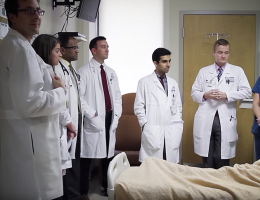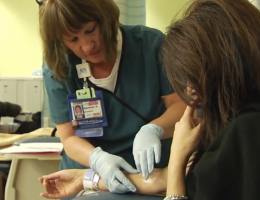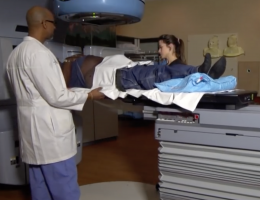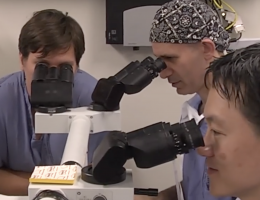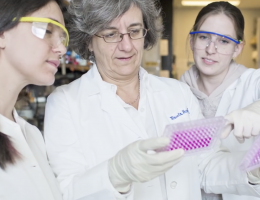Patients and visitors to Emory’s many healthcare facilities benefit from efforts to make indoor environments healthier and better situated to utilize resources wisely. Check out what we are doing to support the health and wellbeing of everyone – patients, visitors and staff – at all Emory healthcare facilities.
Acknowledging the ancestral peoples and land
Emory’s Office of Sustainability Initiatives acknowledges the Muscogee (Creek) people who lived, worked, produced knowledge on, and nurtured the land where Emory’s Oxford and Atlanta campuses are now located. The Muscogee people were forcibly removed from states like Georgia and Alabama during the Trail of Tears relocation (1830-1838), a shameful part of our history when the federal government forced Indigenous peoples across the region to leave their ancestral homes. In 1836, Emory University was founded on part of this land. It is important for us to acknowledge, honor, and respect the land we now call home; to further recognize the inherent intersections between Indigenous rights, sustainability, and the environment; and to continue to strive for justice and recognition for Indigenous communities.
Read Emory’s official Land Acknowledgement and learn more here.
GET AROUND GREEN
- Follow our interactive, sustainability maps to plan your trip and learn more about sustainability efforts around campus.
- Understand how to get around campus sustainably, whether it’s by taking MARTA or using our biofuel-powered shuttles.
- Learn about our No Idle Policy, where to charge your electric car or find alternative fuel, and how to rent a CarShare.
KEEP IT SUSTAINABLE
- In June 2021, President Gregory L. Fenves signed the ‘Break Free From Plastic Pledge‘, which aims to reduce unnecessary single-use plastics on Emory’s Atlanta and Oxford campuses by 2026. Students can do their part by limiting the amount of Styrofoam, plastic bags, plastic straws, and other single-use plastics that they consume. In most cases, these products are brought onto campus in the form of takeout food packaging.
- Recycle your cans and bottles at Emory Hospital cafes and help us achieve zero landfill waste. Look for the following diagram at the Clifton and Asbury Cafes’ waste stations:
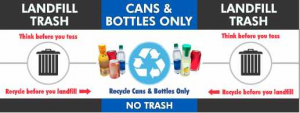
- Use the green and blue bins located outside of many of our facilities. Put food in the green compost bins and everything else in the blue recycle bins.
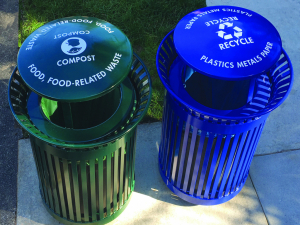
- Enjoy locally and sustainably sourced food in cafes and coffee shops around Emory’s campus.
- Visit Emory’s Farmers Market to learn about sustainable food choices and pick up some locally grown food.
- Stop by one of our educational gardens and see what Emory is doing to bring sustainable food options to our community.
LEARN MORE
- Did you know the Emory University Hospital Tower, completed in 2017, is the first Emory Healthcare building to become LEED certified?
- Get more details by reading the Emory Sustainability Vision and Strategic Plan.
- Sign up for the Office of Sustainability e-newsletter; follow us on Facebook and Twitter.
Helpful Documents and Links for Hospital Visitors
| Title | Initiative | Type | Description |
|---|---|---|---|
| Emory Healthcare Sustainability Council Mission & Goals | All Initiatives | Documents & Reports | The Emory Healthcare Sustainability Council was established in September 2009 (formerly the Sustainability in Health Sciences Task Force) to develop a set of recommendations to guide senior administrators in setting goals and year-to-year strategies that will improve current practices or implement new best practices in sustainability for the Woodruff Health Sciences Center. |
| Emory’s 2023 Climate Action Plan | Climate Solutions | Documents & Reports | Emory's most recent climate action plan offers recommendations to guide Emory on its path to net neutrality by 2050. |
| Healthcare Sustainability: Why We Care | All Initiatives | Documents & Reports | Emory University values sustainability in our Healthcare. Use this document to see our goals, accomplishments, and rationals. |
| State of Sustainability in Emory Healthcare | All Initiatives | Documents & Reports | Emory Healthcare sustainability goals and accomplishments as of January 2018 |
| Sustainable Healthcare at Emory University by Lauren Balotin | Wellbeing | Documents & Reports | Learn about initiatives within Emory Healthcare to address sustainability concerns, including waste reduction, energy & water conservation, sustainable hospital food, and the Sustainability in Health Sciences Task Force. [Keywords: sustainable healthcare at Emory, hospital recycling, hospital food] |

